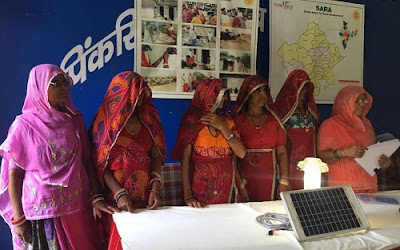Coca-Cola India Foundation announces solar electrification in Rajasthan
Jaipur : In a country where one-fourth of the population lack access to electricity, The Coca-Cola India Foundation, Anandana along with its implementing partners Advit Foundation, Manthan Sansthan, Prayatna Sansthan, and Social Action For Rural Advancement (SARA) and today announced the execution of solar electrification of 15,000 houses by 2017 in Rajasthan, marking the celebration of World Environment Day.
With an aim to provide solar electricity in 15,000 houses, benefiting more than 1,00,000 individualsin 100 villages of Rajasthan, the partners and community members today reaffirmed their commitment of environment conservation and empowering women in rural areas by using renewable energy resources.
The solar electrification of rural India campaign is also contributing to the Prime Minister Narendra Modi’s idea of providing electricity to all households by 2019.
Currently, energy consumption in several households in the remote villages of Rajasthan are predominantly based on fossil fuels (coal, kerosene etc.) for lighting and other household chores. The smoke emission of kerosene lamps and inadequate light contributes to environmental hazard, economic deprivation, health risks and adverse impact on children education.
The use of kerosene lamps in rural India is the prime cause of respiratory infection. The high dependence of India’s energy system on fossil fuel leads to an adverse effect on the environment too. According to a World Bank publication each liter of kerosene burnt produces 2.8 Kgs of CO2.
To address these challenges, Anandana Foundation and its NGO partners are advocating the dire need to use renewable energy resources (solar power) and thereby creating more women advocates for the cause of environment conservation. Under this project, the Foundation has also launched a capacity building training program to train 300 women at the local level for installation, operation, maintenance and repair of the solar lights, thus creating employment generation opportunities.
The availability of solar light will increase the number of productive hours for these women further enhancing the opportunities for livelihood and income.
Present at the occasion, representative heads of Advit Foundation, Manthan Sansthan, Prayatna SANSTHAN, and Social Action For Rural Advancement (SARA), jointly opined, “People of these villages will lead a better life with the usage of solar lanterns. Children will be able to study after dark and people will utilize evening time to earn more by increasing their man hours. The health of these 1, 00,000 people will improve by reduction of kerosene emissions in indoor air. Solar electrification initiative is a step forward towards sustainable development of Rajasthan.”
With an aim to provide solar electricity in 15,000 houses, benefiting more than 1,00,000 individualsin 100 villages of Rajasthan, the partners and community members today reaffirmed their commitment of environment conservation and empowering women in rural areas by using renewable energy resources.
The solar electrification of rural India campaign is also contributing to the Prime Minister Narendra Modi’s idea of providing electricity to all households by 2019.
Currently, energy consumption in several households in the remote villages of Rajasthan are predominantly based on fossil fuels (coal, kerosene etc.) for lighting and other household chores. The smoke emission of kerosene lamps and inadequate light contributes to environmental hazard, economic deprivation, health risks and adverse impact on children education.
The use of kerosene lamps in rural India is the prime cause of respiratory infection. The high dependence of India’s energy system on fossil fuel leads to an adverse effect on the environment too. According to a World Bank publication each liter of kerosene burnt produces 2.8 Kgs of CO2.
To address these challenges, Anandana Foundation and its NGO partners are advocating the dire need to use renewable energy resources (solar power) and thereby creating more women advocates for the cause of environment conservation. Under this project, the Foundation has also launched a capacity building training program to train 300 women at the local level for installation, operation, maintenance and repair of the solar lights, thus creating employment generation opportunities.
The availability of solar light will increase the number of productive hours for these women further enhancing the opportunities for livelihood and income.
Present at the occasion, representative heads of Advit Foundation, Manthan Sansthan, Prayatna SANSTHAN, and Social Action For Rural Advancement (SARA), jointly opined, “People of these villages will lead a better life with the usage of solar lanterns. Children will be able to study after dark and people will utilize evening time to earn more by increasing their man hours. The health of these 1, 00,000 people will improve by reduction of kerosene emissions in indoor air. Solar electrification initiative is a step forward towards sustainable development of Rajasthan.”






